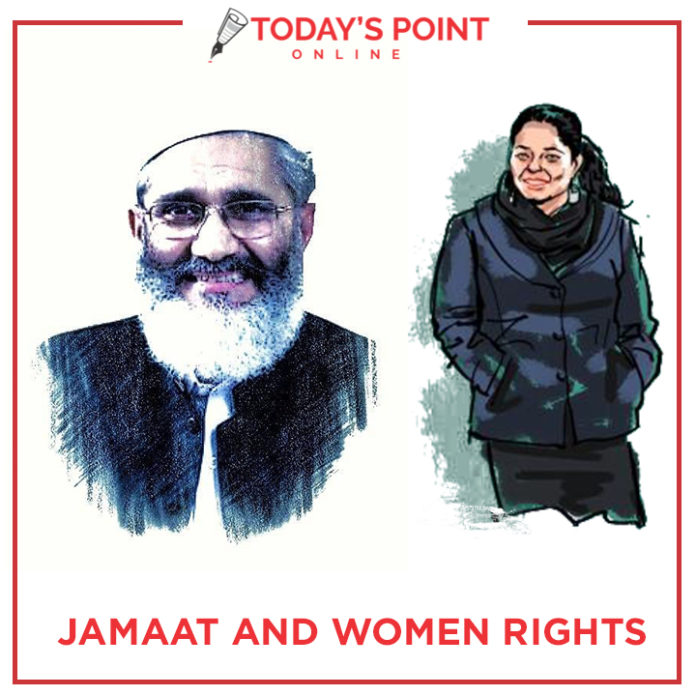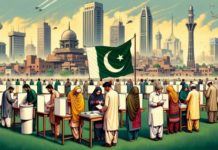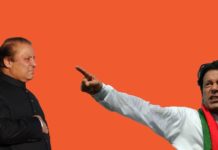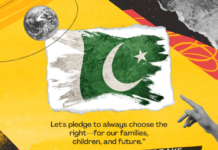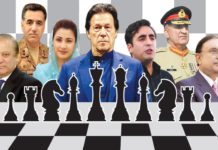This article was first published by , now defunct, Weekly Viewpoint, in 2014. Posted here with permission.
Amir Jamaat-e-Islami, Siraj-ul-Haq, delivered a fiery speech at party’s women convention during the three-day Jamaat moot held at Minar-e-Pakistan last weekend.According to the daily Jang, while addressing the convention, Amir-e-Jamaat said: ‘In the name of equality, women in
the West has been subjected to worst kind of exploitation’. He said, in a clever way the economic burden has also been passed on to the women. Holding Westernised NGOs responsible for the plight of women in Pakistan instead of patriarchy, state and traditions, he claimed: ‘The West is adamant to impose its satanic civilization by subverting the fort of our family system’. Highlighting the contributions made by his party as coalition partner in Khyber-Pakhtonkhwa, he claimed that his party has build number of schools in the province.
Unlike the Taliban, Jamaat is clever. It does not advocate either a Taliban-style blackout of women in public life or an end to women education. However, it wants a radical concealment of women bodies in public and restrictions on their movements. Women can go to schools but not co-ed. They can work but only in certain professions. This is, Jamaat claims, in line with Islamic traditions. A violation of Jamaat-dictated code for women, is tantamount to westernization. Also, the woman lib in the West is a farce.
Let us begin by pointing out Jamaat’s hypocrisy on women question. Including Rahila Qazi, daughter of former Amir-e-Jamaat Qazi Hussain Ahmed, Jamaat activists have been members of National and provincial assemblies. Opponents of co-education and mix-gender work places have no objection over unisex assemblies. Jamaat and other fundamentalist parties should not have fielded women candidates if they believe in segregation.
But let us consider this notion of gender segregation and concept of Islamic dress code. A majority in Pakistan live on the countryside. An agrarian economy will come to a grinding halt if peasant women start practicing Saudised Islam. Burka that Ms Rahila Qazi dons and white shalwar suit Mr Siraj wears are spun from cotton picked by women. You cannot don a burka to pick cotton, harvest the wheat or sow the rice. One wonders if Jamaat will also ban unisex khait (fields). Segregation on the countryside will bring the village life to a halt. Also, will Jamaat provide separate transport, hospitals, bazaars, factories and airports for women? What we need is not segregation but an atmosphere where women have the security to move freely. Not merely in London and Paris, even in Istanbul and Tunis women have achieved this freedom (though levels remain different).
Siraj’s claim that women in the West are exploited is true to the extent that as workers, like their men counterparts, they are exploited under the capitalism. However, Jamaat has no problem with capitalism. It is their work outside of the homes that constitutes exploitation in Siraj’s narrative. One wonders why otherwise intellectually resourceful and immensely empowered women in the West are not able to understand that their place is in the kitchen instead of factories and offices, schools and hospitals. Perhaps they understand that a human being cannot be free without economic independence. Hence, they demanded the day care system so that they could work. The demand was won. In fact, instead of returning to kitchen, western woman is asking for more equality. She knows by rendering unpaid labour in the kitchen, women become unpaid workers for the capitalist system. This is what Jamaat also wants but wants to cloak the capitalist exploitation of women in the garb of religion. If Siraj-ul-Haq truly believes in gender equality, let Jamaat elect a woman Amir next time.
Also Read: A Letter to Maulana Tariq Jamil on Coronavirus


